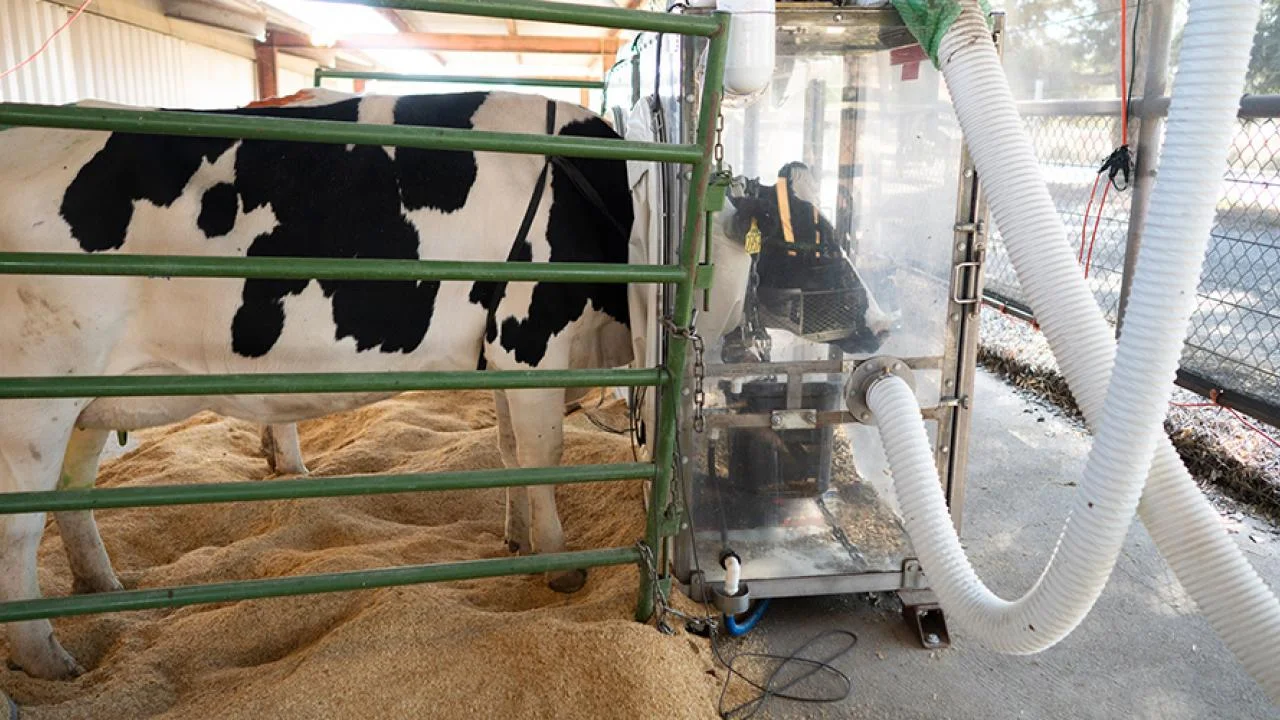Improved Cattle Feed
Improved cattle feed is a crucial strategy for reducing greenhouse gas emissions from livestock, particularly methane produced during digestion. This solution involves developing and implementing feed alternatives and additives that can significantly decrease the environmental impact of cattle farming.

Frank Mitloehner, UC Davis professor and air quality specialist, is researching feed alternatives, such as seaweed, that reduce methane from cow burps. (UC Davis)
View open jobs in this Solution
Example Companies
- Mootral - Develops natural feed supplements to reduce methane emissions from cattle.
- Blue Ocean Barns - Produces seaweed-based feed additives to reduce methane emissions.
- DSM - Offers feed additives that reduce methane emissions from dairy and beef cattle.
- Symbrosia - Produces seaweed-based feed additives to reduce livestock methane emissions.
- Cargill - Develops sustainable animal nutrition solutions, including low-emission feed.
Overview
Improved cattle feed plays a pivotal role in mitigating climate change by reducing methane emissions from livestock. Innovations in feed composition and additives have shown significant potential in decreasing the environmental impact of cattle farming while maintaining or improving productivity.
- Reducing Enteric Methane for Improving Food Security and Livelihoods - FAO
- Feed Additives to Reduce Enteric Methane Emissions - Frontiers in Veterinary Science
Progress Made
Significant advancements have been made in developing improved cattle feed:
- Biochar: Made from agricultural waste, biochar can substantially reduce methane emissions when added to cattle feed.
- Seaweed Additives: Certain seaweed species have shown promise in reducing methane emissions from cattle.
- Synthetic Biology: Innovations in creating alternative proteins and feed supplements through biotechnology.
Solutions by Sector
Feed Additives
- Seaweed-Based Supplements: Additives derived from specific seaweed species to reduce methane production.
- Enzyme Supplements: Enzymes that improve feed digestibility and reduce methane emissions.
- Essential Oils: Plant-derived compounds that can modify rumen fermentation and reduce methane.
Case Studies:
- Mootral: Developed a garlic and citrus extract-based feed supplement that reduces methane emissions by up to 38% (Mootral).
- Blue Ocean Barns: Produces Asparagopsis taxiformis seaweed supplement, reducing methane emissions by over 80% in trials (Blue Ocean Barns).
- DSM: Created Bovaer®, a feed additive that reduces methane emissions by approximately 30% for dairy cows and up to 90% for beef cattle (DSM).
Alternative Proteins
- Insect-Based Proteins: Using insects as a sustainable protein source for cattle feed.
- Algae-Based Proteins: Developing protein-rich feed from algae cultivation.
- Plant-Based Proteins: Optimizing plant-based protein sources for cattle nutrition.
Case Studies:
- Protix: Produces insect-based proteins for animal feed, offering a sustainable alternative to traditional protein sources (Protix).
- Calysta: Develops FeedKind®, a protein made from fermented natural gas, as an alternative to fishmeal in aquaculture and potentially in cattle feed (Calysta).
- Arbiom: Produces SylPro®, a wood-derived protein for animal feed, including potential applications in cattle nutrition (Arbiom).
Feed Management Systems
- Precision Feeding: Using data and technology to optimize feed composition and quantity.
- Grazing Management: Implementing rotational grazing and other techniques to improve pasture quality and reduce emissions.
- Feed Efficiency Monitoring: Systems to track and improve the feed conversion efficiency of cattle.
Case Studies:
- Cargill: Developed the Dairy Enteligen® platform, which uses data analytics to optimize cattle nutrition and reduce environmental impact (Cargill).
- Alltech: Offers the E-CO2 project, which helps farmers measure and reduce their carbon footprint through improved feed management (Alltech).
- Breedr: Provides a livestock performance platform that helps farmers improve feed efficiency and reduce emissions through data-driven decisions (Breedr).
Lessons Learned
- Collaborative Approach: Success requires collaboration among scientists, farmers, and policymakers.
- Measurable Impact: Successful interventions have shown substantial methane reduction in pilot programs.
- Adoption Challenges: Large-scale adoption faces hurdles such as limited feed availability and lack of proper communication.
- Economic Viability: Solutions must be economically viable for farmers to ensure widespread adoption.
Challenges Ahead
- Awareness: Limited awareness about the potential of improved cattle feed among farmers and the public.
- Scalability: Scaling production of novel feed additives to meet global demand.
- Regulatory Approval: Navigating regulatory processes for new feed additives and technologies.
- Cost: Ensuring the cost-effectiveness of improved feeds compared to traditional options.
Best Path Forward
- Research and Development: Continued investment in R&D to refine technologies and improve cost-effectiveness.
- Public Awareness: Amplify public awareness about the advantages of improved cattle feed.
- Government Collaboration: Work with governments to establish incentives for farmers adopting low-emission feeds.
- Industry Partnerships: Form alliances with NGOs and institutions for broader promotion and support.
- Integrated Approach: Combine feed improvements with other sustainable farming practices for maximum impact.
Image credit: UC Davis